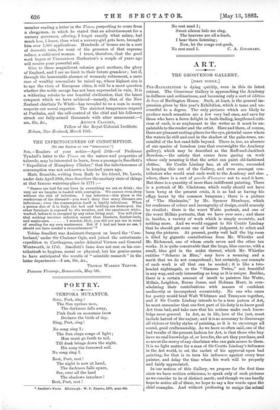THE INFECTIOUSNESS OF CONSUMPTION.
[To THE EDITOR OF THE "SPECTATOR."
SIR,—Readers of your notice—April 29th—of Professor Tyndall's letter to the Tines on the nature and properties of tubercle, may be interested to learn, from a passage in Smollett's " Expedition of Humphrey Clinker," that the infectiousness of consumption was not unknown a hundred years ago.
Matt. Bramble, writing from Bath to his friend, Dr. Lewis, under date April 28th, thus describes the sanitary state of things at that famous watering-place in 1771 :—
" Snares are laid for our lives in everything we eat or drink; the very air we breathe is loaded with contagion. We cannot even sleep without the risk of infection. I say infection—this place is the rendezvous of the diseased—you won't deny that many diseases are infectious; even the consumption itself is highly infectious. When a person dies of it in Italy, the bed and bedding are destroyed, the other furniture is exposed to the weather, and the apartment white- washed, before it is occupied by any other living soul. You will allow that nothing receives infection sooner than blankets, feather-beds,
and mattresses I wonder, Dick, you did not put me in mind of sending for my own mattresses. But if I had not been an ass, I should not have needed a remembrancer."*
Tobias Smollett was Assistant-Surgeon on board the Cum- berland,' under Sir Chaloner Ogle, and joined the unfortunate expedition to Carthagena, under Admiral Vernon and General Wentworth, in 1741. Smollett's fame does not rest on his con- tribution% to hygiene, moral or physical, but his genius seems to have anticipated the results of " scientific research" in the latter department.—I am, Sir, &c.,
THOMAS WARREN TREVOR.
Pennon Vicarage, Beaumaris, May 5th.


































 Previous page
Previous page